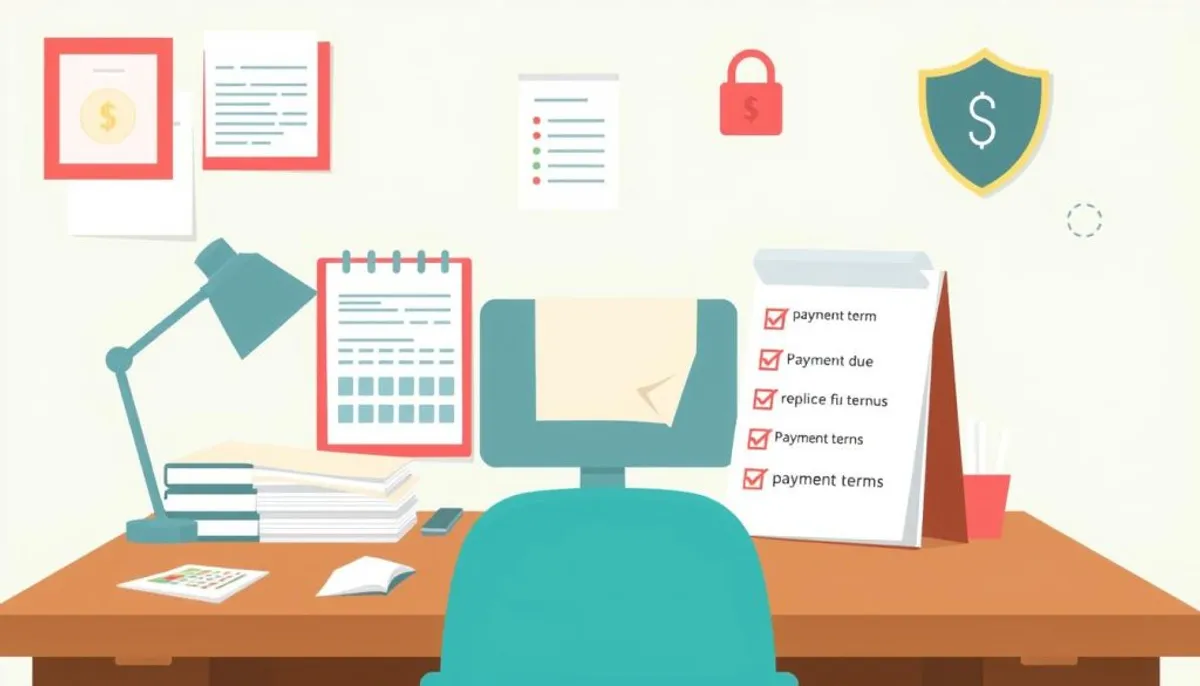Unpaid invoices can significantly disrupt a business’s cash flow and even lead to legal complications. Fortunately, there are effective strategies to manage accounts receivable and prevent such issues. Let’s examine some of these methods to maintain a healthy financial flow.

Did you know that transitioning to electronic invoicing can save up to 50 hours weekly on preparation? This transformation is a significant leap forward in accounts receivable management. Further, 87% of finance tech leaders assert that buyers are eager to abandon checks for digital payment alternatives. It’s imperative to adopt these overdue payment solutions.
One pivotal strategy involves offering diverse payment options. ACH, credit cards, and virtual cards can expedite the collection process. Businesses that incentivize early payments through discounts also experience improved outcomes. Late fees serve as a powerful motivator for clients to adhere to payment schedules.
Effective communication is essential. Clearly outline payment terms and expectations. By implementing these strategies, you will be well-prepared to address unpaid invoices effectively.
Key Takeaways
- Electronic invoicing saves time and improves efficiency
- Offer multiple payment options to speed up collections
- Consider early payment discounts and late payment fees
- Communicate payment terms clearly
- Embrace digital payment methods
- Use automation software to enhance accounts receivable management
- Stay proactive in addressing potential payment issues
Understanding the Impact of Unpaid Invoices on Your Business
Unpaid invoices can severely disrupt your business operations. We will examine the significant consequences of delayed payments. Also, the importance of effective invoice collection strategies will be highlighted.
Cash flow disruptions
Late payments can severely harm your company’s financial health. A staggering 80% of businesses that fail cite cash flow issues as the primary cause. These issues often stem from unpaid invoices. With only 38% of invoices paid on time, many companies struggle to cover operational costs and invest in growth opportunities.
Reduced team morale
Delayed payments can negatively affect your team’s motivation. Employees may feel undervalued when their hard work goes unrewarded due to cash flow issues. This sentiment can lead to decreased productivity and increased turnover rates, further impacting your business performance.
Potential legal costs
Pursuing unpaid invoices through legal channels can be expensive and time-consuming. Many businesses spend up to 14 hours per week on administrative tasks related to collecting payments. These efforts often involve sending late payment reminders and negotiating with clients, taking valuable time away from core business activities.
| Impact | Statistics |
|---|---|
| Businesses affected by late payments | 89% of SMBs report growth hindrance |
| Average amount owed in late payments | Approximately $300,000 |
| Time spent on payment collection | 14 hours per week |
| SMB failures due to poor cash flow | 90% |
To mitigate these impacts, businesses must implement robust invoice collection strategies. Utilizing effective late payment reminders is crucial. By addressing unpaid invoices promptly, you can safeguard your company’s financial health. This ensures sustainable growth.
Common Reasons for Late or Missed Payments
Understanding the reasons behind delayed payments is essential when managing delinquent clients. In the United States, a significant 49% of invoices issued by businesses become overdue, posing substantial cash flow challenges. This issue is widespread, affecting businesses globally, with 90% of UK accountants and 94% of US accountants facing late payment situations.
Customer dissatisfaction often leads to delayed payments. When clients are unhappy with the products or services, they may withhold payment as leverage. Cash flow issues on the client’s end, exacerbated by economic uncertainties, also contribute to late payments. Inefficient invoicing processes, notably those based on paper, contribute to delays and errors.
Inconvenient payment methods can deter timely payments. Offering limited payment options can slow down the process, making it harder for clients to pay promptly. Extending credit to unreliable customers without proper vetting is another common pitfall. Implementing credit checks for new clients can help mitigate this risk.
| Common Excuses for Late Payments | Preventive Measures |
|---|---|
| Not receiving the invoice | Use digital invoicing systems |
| Incorrect company information | Verify client details regularly |
| System downtimes | Offer backup payment options |
| Cash flow problems | Offer flexible payment plans |
By addressing these common issues and implementing effective overdue payment solutions, businesses can significantly reduce late payments and improve their financial health. Regular communication, offering multiple payment options, and maintaining accurate records are key strategies in preventing payment delays.
Establishing Clear Payment Terms and Policies
Clear payment terms are essential for effective invoice collection and accounts receivable management. Small businesses often spend about 15 days annually chasing late payments. This underscores the necessity for well-defined policies. By establishing clear expectations, you can minimize the risk of unpaid invoices and enhance cash flow.

Creating Legally Binding Contracts
Legally binding contracts safeguard your business interests. They should include detailed payment terms, due dates, and penalties for late payments. Such clarity prevents misunderstandings and serves as a solid basis for collecting payments.
Communicating Payment Expectations Upfront
Effective accounts receivable management hinges on open communication. It is crucial to discuss payment terms before commencing work. This approach minimizes confusion and establishes clear expectations for both parties.
Setting Realistic Due Dates
Setting realistic due dates is critical for timely payments. It is important to consider your client’s payment cycles when setting dates. This flexibility can foster better payment compliance and strengthen business relationships.
| Payment Term | Description | Benefit |
|---|---|---|
| Net 30 | Payment due within 30 days | Standard term, allows for processing time |
| 2/10 Net 30 | 2% discount if paid within 10 days, due in 30 | Encourages early payment |
| 50% Upfront | Half payment before work starts | Reduces risk for large projects |
Implementing these strategies can significantly enhance your invoice collection process and maintain healthy accounts receivable. Remember, clear terms facilitate timely payments and foster better business relationships.
Implementing Effective Invoicing Practices
Effective invoicing practices are essential for managing cash flow and preventing unpaid invoices. By adopting smart strategies, businesses can significantly reduce late payments and improve their financial health.
Transitioning to electronic invoicing systems is a key practice. These digital solutions can save up to 50 hours a week compared to manual preparation. Plus, electronic invoices often result in getting paid twice as fast as paper invoices.
When sending invoices, ensure they reach the correct person and address. Short, personalized emails with subject lines of 50 characters or less can increase open rates by 12%. Include clear payment terms and due dates on every invoice – this simple step can increase on-time payments by 8 times.
Offer a variety of payment options to make it easier for clients to pay. This can include:
- ACH transfers
- Credit cards
- Virtual cards
- Mobile-friendly payment methods
Consider incentivizing early payments with discounts or offering installment plans for larger invoices. These strategies can help prevent late payments and reduce the need for late payment reminders. Remember, knowing how to handle unpaid invoices starts with effective invoicing practices.
Utilizing Technology for Invoice Management
Integrating technology into accounts receivable management can transform your invoice processes. Modern tools provide advanced overdue payment solutions, enhancing efficiency and streamlining operations.
Adopting Electronic Invoicing Systems
Electronic invoicing systems are transformative in invoice management. They significantly reduce processing time, from 10.1 days to just 3.9 days. These systems also minimize manual entry errors, which are responsible for 27.5% of all invoice-related mistakes. By embracing e-invoicing, businesses can save over 90% of staff time previously spent on manual invoice entry.
Automating Payment Reminders
Automation tools are essential in accounts receivable management. They automate the sending of payment reminders, reducing the need for manual follow-ups. This automation helps businesses address the 55% increase in late payments experienced by SMEs over the past year. It also frees up the 21-30 hours per month that 31% of businesses spend chasing payments.
Integrating with Accounting Software
Integrating invoicing with accounting software enhances financial oversight. It allows for seamless data synchronization, eliminating the need for manual data entry. This integration is critical, given that 80% of businesses still rely on manual data entry for invoices. By leveraging technology, companies can reduce invoice processing costs from £4-£25 to less than £1 per invoice.
Implementing these technological solutions in invoice management can lead to significant improvements in cash flow, reduced errors, and enhanced productivity. It’s a wise investment for businesses aiming to optimize their accounts receivable processes and minimize overdue payments.
Offering Flexible Payment Options

Dealing with delinquent clients poses significant challenges, yet offering flexible payment options emerges as a shrewd strategy. A 2022 study revealed that nearly half of all business invoices in the United States face delays. In response, companies are embracing diverse payment methods to align with client preferences and enhance cash flow.
Digital payments have surged in popularity. Accepting credit cards and ACH transfers simplifies the payment process for clients. For substantial invoices, consider establishing payment plans or installments. This strategy is beneficial for long-term clients facing short-term financial hurdles.
Research indicates that nine out of ten consumers favor texting businesses. Integrating a pay-by-text feature can notably decrease late payments. Further, offering online payments through patient portals or Electronic Health Records (EHR) systems streamlines the process for healthcare providers.
- Bank transfers (ACH payments)
- Scheduled payments
- Payment plans
- Pay-by-text
- Online payments
By offering these flexible options, you enhance the likelihood of receiving timely payments and foster positive client relationships. The objective is to simplify the payment process, minimizing the risk of unpaid invoices and bolstering your financial well-being.
How to Handle Unpaid Invoices
Managing unpaid invoices poses a significant challenge for small business owners. The rate of nonpayment varies across industries. A well-thought-out strategy often results in timely payments. We will examine effective strategies for handling overdue invoices and ensuring a steady cash flow.
Sending Friendly Payment Reminders
Initiate by sending polite late payment reminders. Many instances of late payment stem from genuine oversight. A gentle reminder can prompt immediate action. Utilize email for the initial outreach, maintaining a professional yet courteous tone.
Escalating Communication Methods
If emails fail to elicit a response, escalate your communication tactics. Consider phone calls or text messages. Personalized approaches, such as expressing concern over the delay, can be highly effective. Your aim is to preserve good relationships while securing the payment.
Negotiating Payment Plans
For clients facing financial difficulties, propose flexible payment options. Payment plans can be beneficial when full payment is not feasible upfront. This strategy often yields positive results. Consider the following strategies:
- Offer a monthly fee of 1% for late payments
- Propose a 2% discount for early payment
- Suggest various payment methods to ease transactions
If these strategies prove ineffective, contemplate invoice factoring or engaging debt collection agencies as final options. Remember, clear communication and flexibility are paramount in effectively managing unpaid invoices.
| Strategy | Success Rate | Best For |
|---|---|---|
| Friendly Reminders | 70-80% | First-time late payers |
| Payment Plans | 60-70% | Struggling but willing clients |
| Early Payment Discount | 50-60% | Cash-strapped businesses |
| Legal Action | 30-40% | Persistent non-payers |
Incentivizing Early Payments and Penalizing Late Ones
Effective accounts receivable management requires a strategic blend of rewards and penalties. Offering incentives for early payments can expedite cash flow, while penalties for late payments can deter delays. A Xero study revealed that over one-third of customers pay at least two weeks late, underscoring the necessity for robust overdue payment solutions.
To foster timely payments, consider offering a modest discount of up to 5% for clients who settle their invoices within 14 days. This approach can notably enhance cash flow and diminish the necessity for follow-ups. Simultaneously, late payment fees can act as a deterrent for habitual late-payers.
Integrating technology into your invoicing process can streamline accounts receivable management. Utilizing accounting software like QuickBooks or FreshBooks enables automated invoicing and follow-ups, thus saving time and effort. These platforms often include features such as “Pay Now” buttons, which can expedite online payments by four times.
- Offer 1-2% discount for payments within 10 days
- Implement late payment fees, clearly communicated in contracts
- Consider credit card payment options for struggling clients
- Use accounting software to automate invoicing and reminders
By harmonizing incentives and penalties, businesses can establish a more efficient payment system. It is essential to note that 73% of businesses are negatively impacted by late payments, making effective overdue payment solutions imperative. With the appropriate strategies in place, you can optimize your cash flow and preserve robust client relationships.
Building Strong Client Relationships to Encourage Timely Payments
Establishing robust client relationships is paramount for ensuring timely payments and successful invoice collection strategies. By cultivating positive connections, businesses can diminish the occurrence of delinquent clients and sustain a robust cash flow.
Maintaining Open Communication
Open communication stands as a cornerstone in averting payment-related issues. Regular interactions and transparent dialogues regarding payment terms can effectively circumvent misunderstandings. Research indicates that enterprises with clear communication channels witness a decrease in late payments. The average payment time drops from 38 to 34 days over an eight-month span.
Providing Excellent Customer Service
Outstanding customer service profoundly influences payment behavior. When clients perceive value, they are more inclined to prioritize your invoices. This strategy can notably reduce the 45% of businesses encountering late payments from clients.
Addressing Issues Promptly
Swift resolution of disputes or concerns is essential for maintaining positive relationships and fostering timely payments. By addressing issues expeditiously, businesses enhance their payment collection prospects. On the invoice due date, the likelihood of payment receipt is approximately 95%. This figure diminishes to 89% after 30 days and below 70% after 90 days.
| Days Overdue | Payment Likelihood |
|---|---|
| 0 (Due Date) | 95% |
| 30 | 89% |
| 90+ | Below 70% |
By adopting these strategies, businesses can enhance their invoice collection processes and minimize interactions with delinquent clients. It is crucial to remember that strong relationships, founded on trust and communication, serve as the bedrock for timely payments and enduring business success.
Implementing a Credit Check Process for New Clients
Preventing unpaid invoices begins with selecting clients wisely. A thorough credit check for new clients can greatly lower payment risks. In fact, companies that prioritize credit control see a 65% boost in managing cash flow.
Effective handling of unpaid invoices starts with evaluating a potential client’s financial standing. This entails examining their credit history, payment habits, and overall financial health. Such an approach has resulted in a 23% drop in bad debts for businesses on average.
Integrating credit management software into your accounts receivable management can yield impressive results. Companies employing such tools have seen a 20% reduction in bad debts. This technology streamlines the credit check process and monitors ongoing client relationships. It ensures timely payments and minimizes the risk of unpaid invoices.
It’s crucial to strike a balance. While strict credit policies can cut bad debt write-offs by 30%, moderate policies have shown a 12% growth in customer base. By adopting a thoughtful credit check process, you’ll be better prepared to manage unpaid invoices and maintain a healthy cash flow for your business.
RelatedRelated articles



